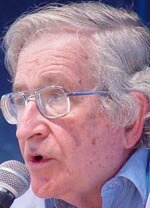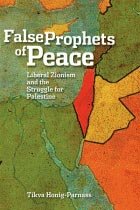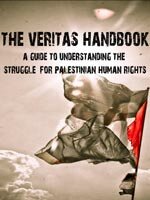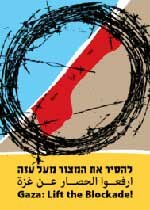[S]ome American officials and pundits are searching for any kind of interpretation that will enable them to divorce US support for the Israeli occupation from America’s relations with the Arab world. By claiming that the Palestinian issue is no longer central to Arab thinking, they imagine that the US can simply impose a ‘solution’ that ensures Israeli hegemony in the region and falls short of accepting the Palestinian people’s right to exercise self-determination.
Int’l
Yossi Alpher: “At this point it’s all spin designed to fend off pressures… The object of the exercise is to gain a day, or a week, or a month, before having to come up with some sort of new spin.”
Suddenly, to be an Arab has become a good thing. People all over the Arab world feel a sense of pride in shaking off decades of cowed passivity under dictatorships that ruled with no deference to popular wishes. And it has become respectable in the West as well. Egypt is now thought of as an exciting and progressive place; its people’s expressions of solidarity are welcomed by demonstrators in Madison, Wisconsin; and its bright young activists are seen as models for a new kind of twenty-first-century mobilization.
(1) The Israeli occupation and its policy of building settlements and displacing the local population are unequivocally illegal and unjustified. (2) The Israeli occupation has been a vicious one, in flagrant violation of international humanitarian law. (3) The Israeli occupation has been the most long-standing occupation in the world. (4) Our government, the US government, has made possible this sordid record of occupation and abuse.
While criticizing decision makers for underestimating the risk of civilian injuries, probe panel says Israel’s Gaza assassination of Salah Shehadeh was a necessary part of its war on ‘murderous terrorism.’
IOA Editor: This is a somewhat diluted version of the Hebrew original. The Haaretz original story points out that the committee found that while the IDF action was “preventative and legitimate,” the result of the bomb used by the IDF was found in retrospect as “disproportional.”
Needless to say, the “Investigation Committee,” appointed by former Israeli PM Ehud Olmert – himself responsible for Israel’s Gaza crimes – did not deal with the legitimacy of the use of any force as a means to prevent the Hamas violence. International law spells out in some detail when force can justifiably be used – generally only as a measure of last resort, after all other efforts have failed: clearly not the case here, and clearly not a concern of this committee.
A crisis erupted between Prime Minister Benjamin Netanyahu and German Chancellor Angela Merkel. During a telephone call this week, Merkel told Netanyahu that he had disappointed her and had done nothing to advance peace.
US Senator John Kerry and Syrian President Bashar Assad reportedly began drafting an unofficial position paper that would define the principles of negotiations with Israel.
The US and Israel have successfully tested Israel’s Arrow 2 ballistic anti-missile system off the coast of California. The joint exercise between Israel Aerospace Industries and the US Missile Defense Agency involved firing a missile from an offshore platform inside a US Navy firing range to see if the Arrow 2 system would detect and destroy the missile.
The main value of the 1979 Camp David treaty to the Israeli leadership has been three decades of calm on Israel’s south-western flank. That, in turn, has freed the army to concentrate on more pressing goals, such as its intermittent forays north to sow sectarian discord in Lebanon, its belligerent posturing towards first Iraq and now Iran in the east, and its campaign to contain and dispossess the Palestinians under its rule.
The Indian Air Force and the Israeli weapons manufacturer Rafael Advanced Defense Systems are set to sign a major contract in March 2011, which will outfit India’s Tejas fighter jets with Rafael’s Derby missile.
US is the only Security Council member that opposes the resolution; though its wording does not conflict with Washington’s stance on settlements it fears that if the resolution passes it will be an obstacle to renewal of peace talks.
Massive public protests continue to sweep the Middle East and North Africa in countries including Bahrain, Libya, Yemen and Iran—many being met with violent government crackdowns. Democracy Now! speaks to Marwan Bishara, senior political analyst at Al Jazeera English, and MIT Professor Emeritus Noam Chomsky.
Israeli Civil rights attorney Lea Tsemel: “The [activists] were focused and continue to be focused on legal, democratic and non-violent protest against settlement trends in East Jerusalem . . . the phrasing of the report suggests the Shin Bet view these activists as similar to terrorists . . . as individuals seeking to harm the security forces.”
With US-made tear gas canisters fired on protesters in Cairo, Washington’s role in arming Egypt is under the spotlight.
Mubarak is taking his cues for impudence from the far rightwing government of Israeli PM Binyamin Netanyahu, which began the Middle Eastern custom of humiliating President Barack Obama with impunity… Israel was founded on the primal sin of expelling hundreds of thousands of Palestinians from their homes in what is now Israel, and then conniving at keeping them stateless, helpless and weak ever after… The policy of the United States has been for the most part to accommodate this Israeli policy and to collaborate in the maltreatment of the Palestinians.
President Shimon Peres has not abandoned his old friend Egyptian President Hosni Mubarak. “We always have had and will have great respect for President Mubaraek. Not everything he did was right, but he did do one thing for which all of us are thankful. He was the peace keeper of the Middle East,” Peres [said].
The failure of the US to halt the slow-motion ethnic cleansing of Palestinians by Israel has consequences. The failure to acknowledge the collective humiliation and anger felt by most Arabs because of the presence of US troops on Muslim soil, not only in Iraq and Afghanistan but in the staging bases set up in Kuwait and Saudi Arabia, has consequences. The failure to denounce the repression, including the widespread use of torture, censorship and rigged elections, wielded by our allies against their citizens in the Middle East has consequences. We are soaked with the stench of these regimes.
The Haifa District Court on Sunday sentenced Israeli Arab activist Ameer Makhoul to nine years in prison and another year suspended sentence for charges of spying and contact with a foreign agent from the Lebanon-based Hezbollah militant organization.
Chief Palestinian negotiator Saeb Erekat said Wednesday in an interview with the Qatar-based Al-Jazeera television that a U.S. citizen, who worked in the U.S. State Department, and a British citizen, a former MI6 and EU official, are the ones responsible for leaking the so-called ‘Palestine papers.’
Ma’aleh Adumim Mayor Benny Kasriel has demanded Prime Minister Benjamin Netanyahu explain reports that he had secretly promised the US that Israel would not build new neighborhoods in E1, a controversial area which connects Jerusalem to the nearby settlement.
A B’Tselem report reveals that as a result, 472 Palestinians, including 223 minors, lost their homes last year, up from 217 – including 60 minors – in 2009.
A summary of important articles and documents covering revelations of The Palestine Papers.
A selection of video reports from Al-Jazeera’s comprehensive coverage of the leaked Israeli-Palestinian negotiations documents.
The “Palestine Papers” demand a serious re-evaluation of two lingering, erroneous assumptions made by many Western observers: 1) the US’ self-proclaimed role as honest broker; 2) the assumption that peace talks have fallen into abeyance chiefly because of the election nearly two years ago of Netanyahu’s rightwing Israeli government. The Americans’ goal was to strong-arm him into bringing into his coalition Tzipi Livni who is widely regarded as the most credible Israeli advocate for peace. However, Livni, previously Mr Olmert’s foreign minister, emerges in the leaked papers as an inflexible negotiator, dismissive of the huge concessions being made by the Palestinians.
IOA Editor: Indeed, as we’ve said since the release of The Palestine Papers.
Al-Jazeera TV , the Guardian: PA agreed to concede almost all of East Jerusalem to Israel, accept Israeli demand to recognize Israel as a Jewish state, and much more.
At a meeting in November 2007, [Livni] told Qureia that she believed Palestinians saw settlement building as meaning “Israel takes more land [so] that the Palestinian state will be impossible”; that “the Israel policy is to take more and more land day after day and that at the end of the day we’ll say that is impossible, we already have the land and we cannot create the state”. She conceded that it had been “the policy of the government for a really long time”.
IOA Editor: US-backed Israeli rejectionism, delivered by Tzipi Livni — generally regarded as Israel’s “more flexible” opposition leader. [Ha!] Nothing that we didn’t already know, other than the details on the specific Palestinian concessions. Even more interesting is Qureia’s March 2008 comment to Condoleezza Rice “You bring back life to the region when you come.” After Israel’s mass killing campaign in Lebanon and the US slaughter Iraq, it would have been far more accurate to state “you bring death to the region.”
Al-Jazeera TV , the Guardian: PA agreed to concede almost all of East Jerusalem to Israel, accept Israeli demand to recognize Israel as a Jewish state, and much more.
Chief Palestinian negotiator, Saeb Erekat: “This is the first time in Palestinian-Israeli history in which such a [concession] is officially made.” … But the offer was rejected out of hand by Israel because it did not include … Ma’ale Adumim as well as Har Homa and several other [settlements] deeper in the West Bank, including Ariel. “We do not like this suggestion because it does not meet our demands,” Israel’s then foreign minister, Tzipi Livni, told the Palestinians.
IOA Editor: US-backed Israeli rejectionism, delivered by Tzipi Livni — generally regarded as Israel’s “more flexible” opposition leader. [Ha!] Nothing that we didn’t already know, other than the details on the specific Palestinian concessions.
Imad Samouni: I know Hebrew and I told the family not to worry because Jews have better hearts than we do, I worked with them for 10 years. They tied us up… There were 46 of us… “The soldiers passed among us, made our home into their hostel… [The shackles] hurt me terribly and my fingers swelled. A soldier tried to open them but couldn’t, and only made them tighter. My wife cried that they hurt me. He brought scissors and cut down to the flesh to open them. My wife cried… And I’m a man, I told them not to cry, and he brought new plastic ties. We stayed that way from Sunday to Monday…
The ‘diplomatic holding action’ that Israel is conducting has enjoyed partial success, but the world is gradually becoming accustomed to the idea that Palestine will join the family of nations this summer.
IOA Editor: A centrist Israeli view about the impending Palestinian statehood. Maybe. Unclear just how any Israeli government — Netanyahu’s or other — would respond. And what kind of state? On that, read Aisling Byrne’s Building a Police State in Palestine.
“If we are building a police state — what are we actually doing here?” So asked a European diplomat responding to allegations of torture by the Palestinian security forces. The diplomat might well ask. A police state is not a state. It is a form of larceny: of people’s rights, aspirations and sacrifices, for the personal benefit of an élite. This is not what the world meant when it called for statehood. But a police state is what is being assiduously constructed in Palestine, disguised as state-building and good governance.
The Palestinian military prosecutor’s office will stop detaining civilians, and civilians will no longer be tried by Palestinian military courts, according to a pledge made by senior officials in the Palestinian security establishment to representatives of the Palestinian human rights group Al-Haq.
IOA Editor: For background and political analysis, see Aisling Byrne’s Building a Police State in Palestine.
It was once widely assumed that creation of the Palestinian state would be negotiated between Israelis and Palestinians. No more. The final nail in the direct-negotiations coffin was driven by Prime Minister Binyamin Netanyahu when he coldly rejected President Obama’s offer of an extra $3.5 billion in U.S. aid in exchange for a 90-day settlement freeze.
IOA Editor: Just when was the last time such an assumption could be made? Twenty years ago? If then. Netanyahu’s predecessors, of the Likud and Labor alike, drove many earlier nails into the negotiations coffin. While Rosenberg is correct in calling for a US recognition of a self-declared future Palestinian state — a theoretical entity lacking borders, authority, or substance — he neglects to mention the historical role of all US governments in the burial of Israeli-Palestinian negotiations: it is US support of Israel — militarily, financially, and diplomatically — that enables the Occupation to continue unabated, now on the Nobel Laureate’s watch.
Medvedev: “As we did in 1988, Russia still recognizes an independent Palestine.” Russian president makes announcement after meeting with PA President Mahmoud Abbas in West Bank; Israeli officials fear recognition will cause a domino effect of other states following Russia’s lead, including China.
The Media Review Network and the Palestine Solidarity Alliance are seeking to secure an arrest warrant in South Africa for Kadima chairwoman Tzipi Livni, who is due to visit that country next week, Channel 10 reported citing South African media outlets.
British film director Ken Loach brought a message of warning to the Palestinians on his first visit to the occupied territories: if you are divided you will fail.
Documents of the Second International session of the Russell Tribunal on Palestine that took place in London on November 20, 21 and 22 2010 on “Corporate Complicity in Israel’s Violations of International Human Rights Law and International Humanitarian Law”.





































